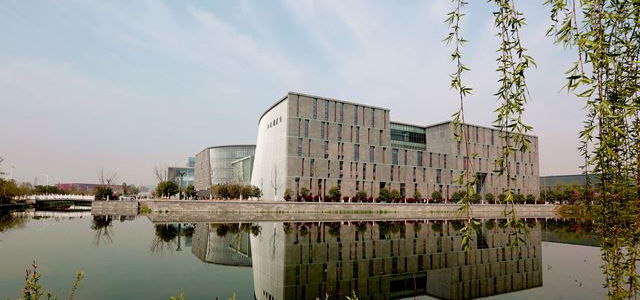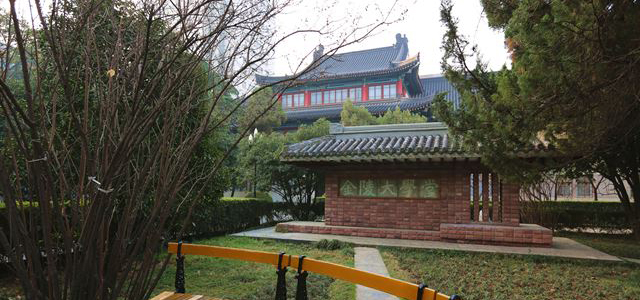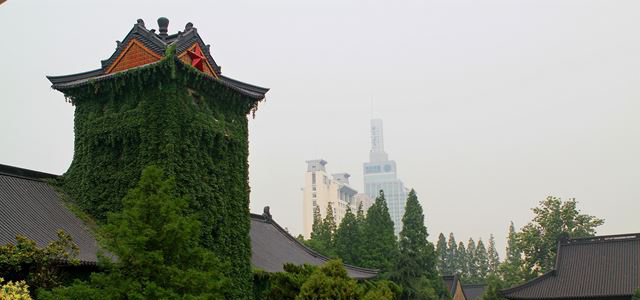Introduction
Nanjing University (working University) is the famous universities in China, is located in Nanjing city, jiangsu province, is China's important base of high-level personnel training and scientific and technological research.
Nanjing University, one of China`s key comprehensive universities under the direct supervision of the Ministry of Education, dates from 1902 when it was known as Sanjiang Normal School. During the following decades, it evolved as Liangjiang Normal School, Nanjing Higher Normal School, National Southeast University, the Fourth Zhongshan University, and National Central University. On August 8, 1949, National Central University was renamed National Nanjing University. In October 1950, as required by the Ministry of Education, the name was changed to Nanjing University (NJU). In 1952, due to the nationwide restructuring of colleges and universities, some academic units such as the School of Engineering and the School of Agriculture were separated from the university; meanwhile, it merged with the School of Liberal Arts and the School of Sciences of the University of Nanking founded in 1888. Its name remained while its campus moved from Sipailou to Gulou.
Today`s NJU consists of three beautiful campuses, Gulou, Pukou, and Xianlin. As a top university in China, it boasts advanced teaching and research facilities. Its current President is Dr. Chen Jun, a geochemist. Each year, the University celebrates its anniversary on May 20.
NJU`s development has always been closely linked with the destiny of China and its ever changing society. Nanjing Higher Normal School, the predecessor of NJU, played an important role in the upsurge of Chinese nationalism following the May Fourth Movement in 1919. In the early 1920s, a group of Chinese communist forerunners from this university introduced the theory of Marxism to the general public. The Second National Conference of Chinese Communist Youth League was also held here. During the Anti-Japanese War, Pan Shu, Liang Xi and Jin Baoshan, renowned professors from the university (then known as National Central University), organized the 'Natural Sciences Forum' and the 'Democracy and Science Forum,' which eventually led to the founding of the democratic party 'Jiu San Society.' During the subsequent Liberation War, the university has always been at the forefront of fight for democracy and nationalism. On May 20, 1947, students from National Central University initiated an 'Anti-Hunger, Anti-Civil War, and Anti-Persecution” campaign, later known as the 'May 20th Patriotic Students Movement.' Such a truth-seeking spirit has been carried forward to the era when the university was renamed Nanjing University. In May 1978, one scholar from the Philosophy Department published in the Guangming Daily an article titled 'Practice Is the Sole Criterion for Testing Truth' which evoked a heated discussion on the 'criterion of truth' and attracted nationwide attention.
In its over 100 years` history, NJU has cultivated a great number of prominent and learned figures, and thus has greatly contributed to the nation`s revitalization and development. Many famous scientists and scholars have studied or worked here, such as Li Ruiqing, Wu Youxun, Zhu Kezhen, Mao Yisheng, Liu Yizheng, Hu Xiaoshi, Tao Xingzhi, Guo Bingwen, Chen Heqin, Tang Yongtong, Ma Yinchu, Li Shutong, Xiong Qinglai, Tong Dizhou, Jin Shanbao, Wen Yiduo, Zhang Daqian, Xu Beihong, Fu Baoshi, Yan Jici, Wu Jianxiong, Li Guoding, Luo Jialun, Gu Yuxiu, Li Fangxun, Wu Mi, Zhu Guangya, Zhao Zhongyao, Pearl S. Buck, Yang Xingfo, Lu Shuxiang, Liang Xi, Dai Anbang, Chen Baichen and Kuang Yaming, to name just a few. Of the twenty-three distinguished scholars recognized by the nation for their pioneering work on the founding of the country`s high-tech system, six are from NJU.
Since China`s reform and opening-up in the late 1970s, NJU has gradually developed multi-disciplinary programs in humanities, social sciences, natural sciences, technological sciences, life sciences, modern engineering and management. Presently, NJU is comprised of 21 schools with 59 departments. It runs 78 undergraduate programs, 213 master`s programs, 9 professional master`s programs, 147 Ph.D. programs (under 23 primary disciplines), and 23 post-doctoral research stations. In addition, NJU has one national laboratory and six national key laboratories, 5 key laboratories of the Ministry of Education, 2 engineering centers of the Ministry of Education, 2 Jiangsu provincial key laboratories, 21 national key disciplines, 24 provincial key disciplines; It also houses 8 national bases for teaching and researching in basic sciences and applied sciences, 3 national bases for basic disciplines education and research, and 4 key bases for researching in humanities and social sciences of MOE. Among its over 2,000 faculty, there are 716 professors and 649 associate professors , including 27 members of the Chinese Academy of Sciences, three members of the Chinese Academy of Engineering, four members of the Third-World Academy of Sciences, one member of the Russian Academy of Sciences and one fellow of the Royal Society of Canada. Along the years, the NJU faculty has won various titles and awards, such as Chief Scientists in the “National Key Basic Research and Development Program” (4), Young and Middle-aged Experts with Distinguished Contributions in Science, Technology and Management (18), National Outstanding Youth Fund Award (87), Chair or Lecture Professors of 'Cheung Kong Scholars Program' (50), Scholars in the “New Century Outstanding Talents Supporting Project” (74), and National distinguished Teachers (7), “Talents Cultivation Program” (9), “New Century Talents Cultivation Program” (8).
With its multi-disciplinary programs and distinguished faculty, NJU leads the institutions of higher learning in China. Statistics show that since 1992, the number of research papers by NJU faculty and students on the Science Citation Index (SCI) has ranked the first among universities in Mainland China for seven consecutive years. So did the number of the articles cited by international academic circles for eight years. In the past decade, NJU has won more than 800 national, ministerial and provincial awards, including over 40 National Awards of Natural Sciences, Awards of Science and Technology Progress, and Awards of Innovation. Since 2000, for instance, it has received 11 National Awards of Natural Science (one First Prize, ten Second Prizes) and two of Science and Technology Progress. From 1994 to the present, in terms of the number of the projects granted by the National Natural Sciences Fund and the National Social Sciences Fund, NJU has been among the top in the ranking of the Chinese universities.
NJU has made remarkable achievements in student education. Its current student body totals around 43,477 (12,655 undergraduates, 11,030 graduates). NJU students have been demonstrating their cutting-edge competitiveness in various competitions inside and outside of China. In 1994 and 1995, the NJU debating team won the championship in both the national and international debating contests; in 1996 and 2005, two championships were won in the International English Speech Contest in Britain. Students, when graduating from NJU, enjoy a wide popularity in the job market for their solid academic foundations and strong potentials for future development. In academics, NJU graduates have also achieved great success. So far, seven alumni were granted the US President`s Award, and some scientific findings were named after the individuals who once studied or worked at NJU (e.g., “Zhou-Gong: Distributing Mutual-Changes Theory,” “Wu: Solidarity Theory,” etc.). In 1999, NJU was the first comprehensive university whose undergraduate education was appraised by the Ministry of Education as excellent.
NJU provides good facilities for both teaching and research work. Its library, one of the largest of its kind in China, has a collection of over 4.654 million volumes. On campus, there are 127 institutes, 98 interdisciplinary research centers, and many other teaching and researching facilities such as the Analysis Center, the Network and Information Center, and the Educational Technology Center.
In addition to the excellence in teaching and research work, NJU is also known for its vigorous exchanges with the outside world. Starting from 1979, it has established academic links with more than 200 universities and research institutes in around 70 countries, and hosted over 120 international conferences. Nearly 2,500 faculty members have been abroad to pursue higher degrees or conduct research work, while over 1,800 international scholars have taught or lectured and more than 18,000 international students studied on NJU campus. Nobel Prize laureates such as Chen Ning Yang, Tsung Dao Lee, Chao Chung Ting, Ilya Prigogine, Sheldon Glashow, and Robert Mandel have been conferred Honorary Doctorates or Honorary Professorship, and large numbers of world famous statesmen, scientists, and social activists (e.g., former US President George Bush, former French President Francois Mitterrant, former Australian Prime Minister Robert Hawk, etc.) have visited here. NJU never ceased its efforts to explore possible modes of cooperation and to learn from international experiences in teaching, researching and management. Such efforts resulted in the founding of the Center for Chinese and American Studies (with the Johns Hopkins University, US), the Sino-German Institute for Law Studies (with Gottingen University, Germany), and the Lab of Multi-Media Distance Teaching System (with the Japanese Ministry of Tele-Communication). Regarded as 'an overseas campus on the Chinese land,' the Center for Chinese and American Studies has become a successful example of educational cooperation between China and the United States, and received much attention and acclamation from governments of both countries.
During its development, NJU has gained continuous support from both the government and the general public. In his 1992 visit, President Jiang Zemin encouraged NJU, as an educational and research center, to reach the world standards while preserving its own unique features. In 1994, NJU was among the first group of universities in the 'Project 211' (which aimed at upgrading 100 Chinese universities into the world-class ones). In July 1999 and October 2006, agreements were signed between the Ministry of Education and Jiangsu Provincial Government to jointly support NJU’s future development.
In May 2002, NJU celebrated its 100th anniversary and successfully organized the Centennial Ceremony, the World Famous Scientists` Forum, and Dialogue with Masters attended by more than 25,000 alumni, together with guests from home and abroad (including 6 Nobel Prize laureates, over 120 academicians and around 100 university presidents). Seven alumni were awarded the Centennial Achievement Gold Medal. Donation from the alumni and other sources amounted to RMB139 million.
In the new century, NJU will deepen its reforms while carrying on its traditions. Aiming at excellence and innovativeness, it is headed for a world-class comprehensive research university with a global vision, and thus it will play a more prominent role in China`s rise in the 21st century.
(updated on Nov. 16, 2007)






